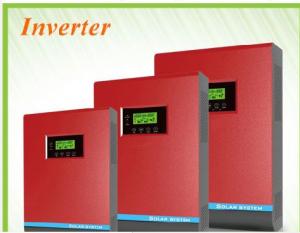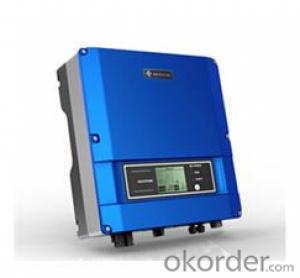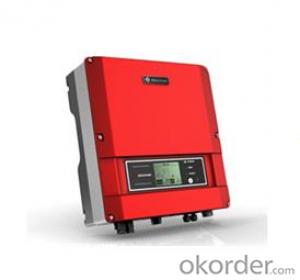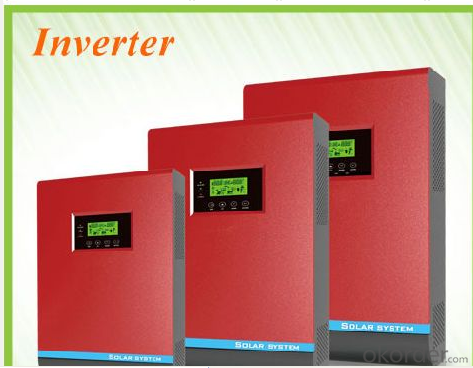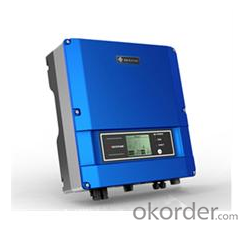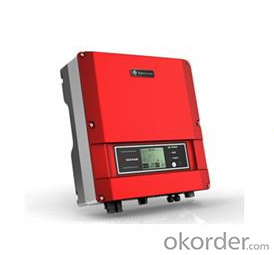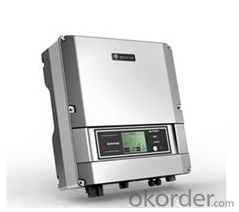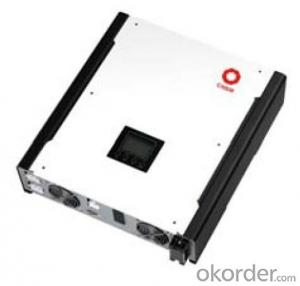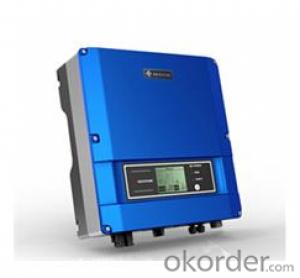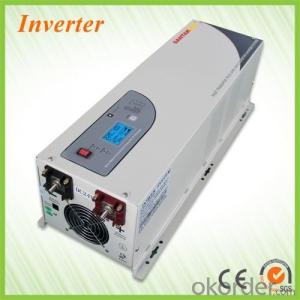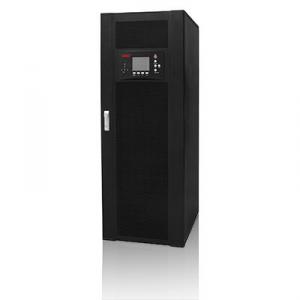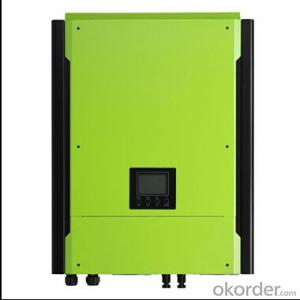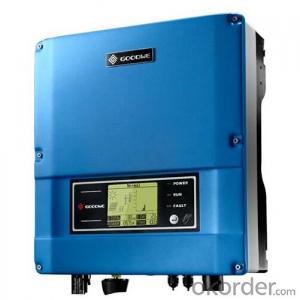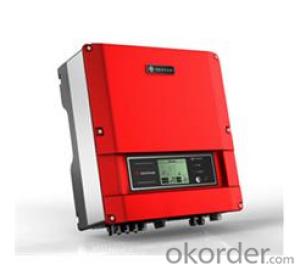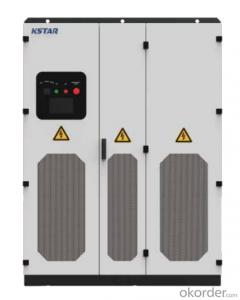Infini Solar Inverter GS1500-SS
- Loading Port:
- Shanghai
- Payment Terms:
- TT or LC
- Min Order Qty:
- 10 unit
- Supply Capability:
- 100 unit/month
OKorder Service Pledge
OKorder Financial Service
You Might Also Like
Description:
GW1500-SS photovoltaic inverter is suitable for home rooftop photovoltaic system, designed under modern industrial concept. There are three colors for option with fashionable appearance. This model is applicable for the photovoltaic system with open-circuit voltage less than 450V, maximum output power less than 1800W. Its maximum conversion efficiency can reach 97%. First-class harmonic control ability, small size and light weight make it hold a safe lead among similar products.
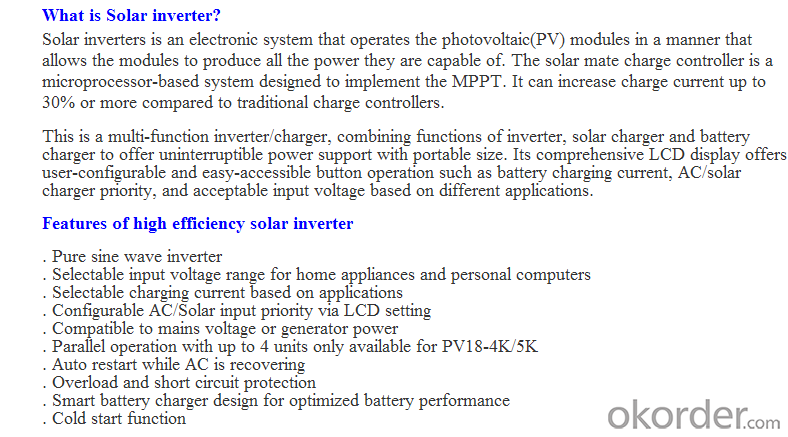
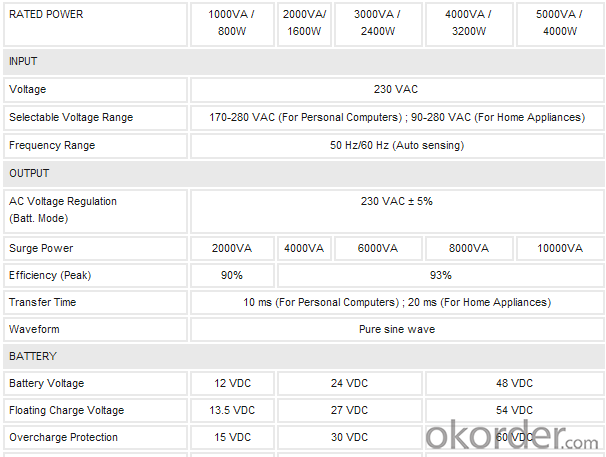
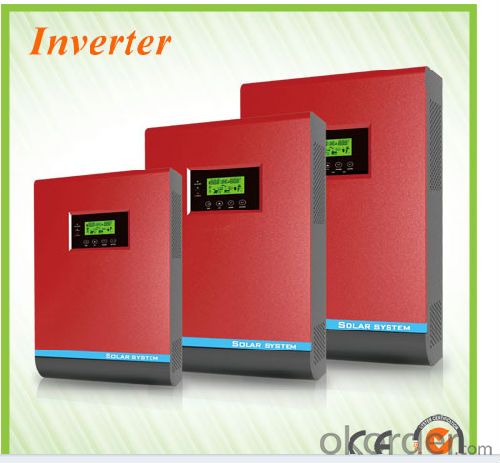
FAQ:What's your warranty?
Our warranty is 1 year
- Q: Can a solar inverter be used in a solar-powered desalination system?
- Yes, a solar inverter can be used in a solar-powered desalination system. A solar inverter is responsible for converting the DC (direct current) output from solar panels into AC (alternating current) electricity that can be used to power various devices. In a solar-powered desalination system, the solar inverter would play a crucial role in converting the DC power generated by the solar panels into the AC power necessary to operate the desalination equipment, thereby enabling the system to function efficiently.
- Q: Can a solar inverter be used for commercial-scale solar installations?
- Yes, a solar inverter can be used for commercial-scale solar installations. Solar inverters are essential components of any solar PV system, converting the DC electricity generated by solar panels into AC electricity suitable for commercial use. They are available in various sizes and capacities, allowing them to accommodate the power requirements of large-scale commercial installations. Additionally, advanced features like grid-tie functionality and monitoring capabilities make solar inverters suitable for integration into commercial-scale solar installations.
- Q: How does a solar inverter handle voltage and frequency variations caused by load shedding?
- A solar inverter is designed to handle voltage and frequency variations caused by load shedding by having built-in mechanisms and control systems. When load shedding occurs and the grid voltage or frequency deviates from the normal range, the solar inverter detects these variations and adjusts its operation accordingly. To handle voltage variations, the solar inverter employs a voltage regulation system. It continuously monitors the grid voltage and compares it with the standard voltage level. If the grid voltage decreases or increases beyond the acceptable range, the inverter adjusts its internal voltage conversion process to maintain a stable output voltage. This ensures that the connected solar panels continue to generate power within the acceptable voltage limits, minimizing any negative effects due to voltage fluctuations. Similarly, for frequency variations caused by load shedding, the solar inverter has a frequency regulation mechanism. It monitors the grid frequency and compares it with the standard frequency level. In cases of frequency deviations, the inverter adjusts its internal synchronization process to match the grid frequency. This allows the inverter to synchronize with the grid and feed the generated solar power in a manner that is compatible with the grid's frequency. In addition to voltage and frequency regulation, solar inverters often have additional functionalities to enhance their ability to handle variations caused by load shedding. These may include features such as anti-islanding protection, which ensures that the solar system disconnects from the grid during a power outage to prevent safety hazards to utility workers attempting to restore power. Furthermore, some advanced inverters can also have energy storage capabilities, allowing them to store excess solar energy and provide uninterrupted power supply during load shedding events. Overall, solar inverters are specifically designed to handle voltage and frequency variations caused by load shedding. Through their regulation and control systems, they ensure that the solar power generated from the panels remains stable and compatible with the grid, providing a reliable and efficient power supply even during challenging grid conditions.
- Q: How does a solar inverter interact with the electrical grid?
- A solar inverter interacts with the electrical grid by converting the direct current (DC) produced by solar panels into alternating current (AC), which is the standard form of electricity used in the grid. It synchronizes the AC output with the grid's frequency and voltage levels, allowing the solar energy to be seamlessly integrated and fed into the grid. Additionally, the inverter monitors the grid's requirements and adjusts the power output accordingly, ensuring efficient and safe operation while maintaining grid stability.
- Q: What is the role of a solar inverter in reactive power compensation during grid disturbances?
- The role of a solar inverter in reactive power compensation during grid disturbances is to regulate and stabilize the flow of reactive power from the solar panels to the grid. During grid disturbances, such as voltage fluctuations or power imbalances, the inverter adjusts the reactive power output to maintain grid stability and improve power quality. By injecting or absorbing reactive power as needed, the solar inverter helps to maintain the grid voltage within acceptable limits and minimize disruptions in the power supply.
- Q: How does a solar inverter handle sudden changes in solar irradiance?
- A solar inverter handles sudden changes in solar irradiance by continuously monitoring the amount of solar energy being generated. When it detects a sudden change in solar irradiance, the inverter adjusts its internal settings accordingly to maintain a stable output voltage and frequency. This allows it to effectively handle fluctuations in solar power input and ensure a consistent and reliable flow of electricity to the connected loads or the grid.
- Q: Can a solar inverter be used in a commercial or industrial setting?
- Yes, a solar inverter can indeed be used in a commercial or industrial setting. In fact, solar inverters are commonly used in these settings to convert the direct current (DC) produced by solar panels into alternating current (AC) that can be used to power various electrical loads in the facility. This helps businesses and industries reduce their reliance on traditional energy sources and save on electricity costs while promoting sustainability.
- Q: How do you maintain a solar inverter?
- To maintain a solar inverter, regular inspections and cleanings are necessary to ensure optimal performance. This includes checking for any loose connections, dust or debris accumulation, and ensuring proper ventilation. Additionally, monitoring the inverter's performance and output regularly can help identify any issues or anomalies that may require professional attention. It is also advisable to follow the manufacturer's guidelines and recommendations for maintenance and servicing.
- Q: What safety features should a solar inverter have?
- A solar inverter should have several safety features, including overvoltage protection, overcurrent protection, ground fault protection, and arc fault protection. Additionally, it should have robust insulation to prevent electrical shock hazards and be equipped with sensors to monitor temperature and prevent overheating. Finally, it should have a secure enclosure to protect against environmental factors such as water, dust, and debris.
- Q: What is the role of a power factor controller in a solar inverter?
- The role of a power factor controller in a solar inverter is to regulate and optimize the power factor of the inverter's output. It ensures that the power drawn from the grid or generated by the solar panels is in sync with the voltage and current, minimizing reactive power and maximizing the efficiency of the system. By maintaining a high power factor, the power factor controller helps reduce energy losses, improve overall system performance, and comply with grid regulations.
Send your message to us
Infini Solar Inverter GS1500-SS
- Loading Port:
- Shanghai
- Payment Terms:
- TT or LC
- Min Order Qty:
- 10 unit
- Supply Capability:
- 100 unit/month
OKorder Service Pledge
OKorder Financial Service
Similar products
Hot products
Hot Searches
Related keywords
